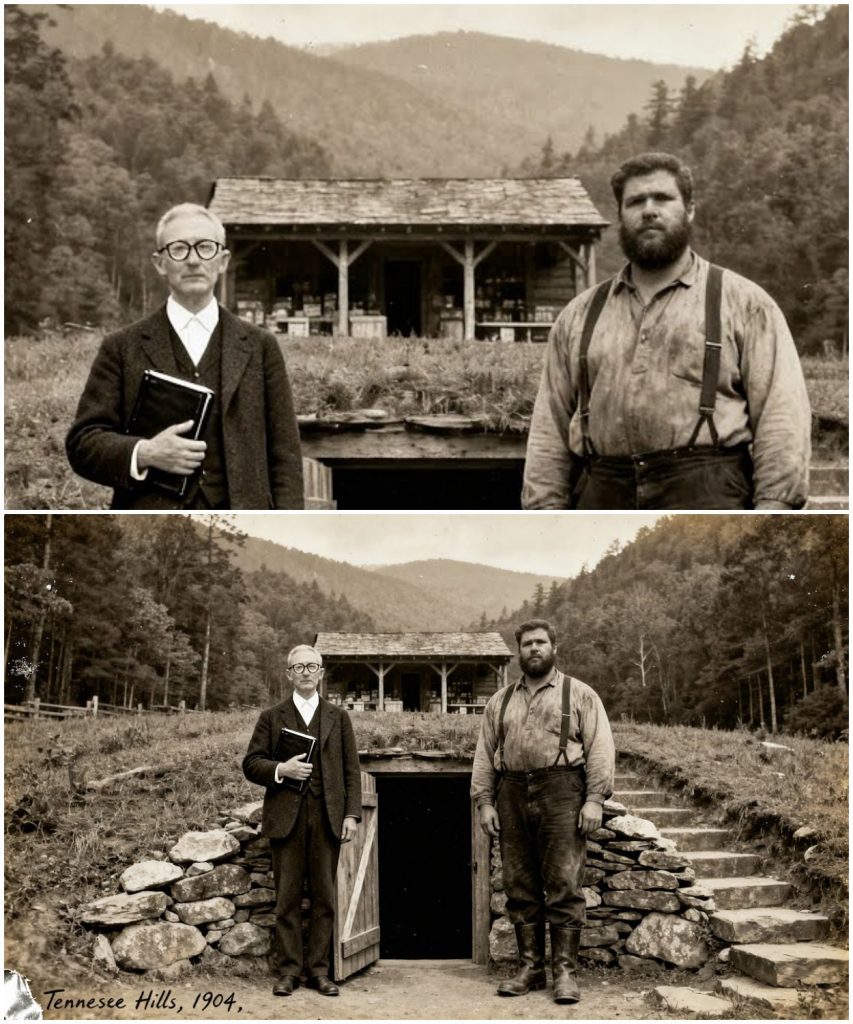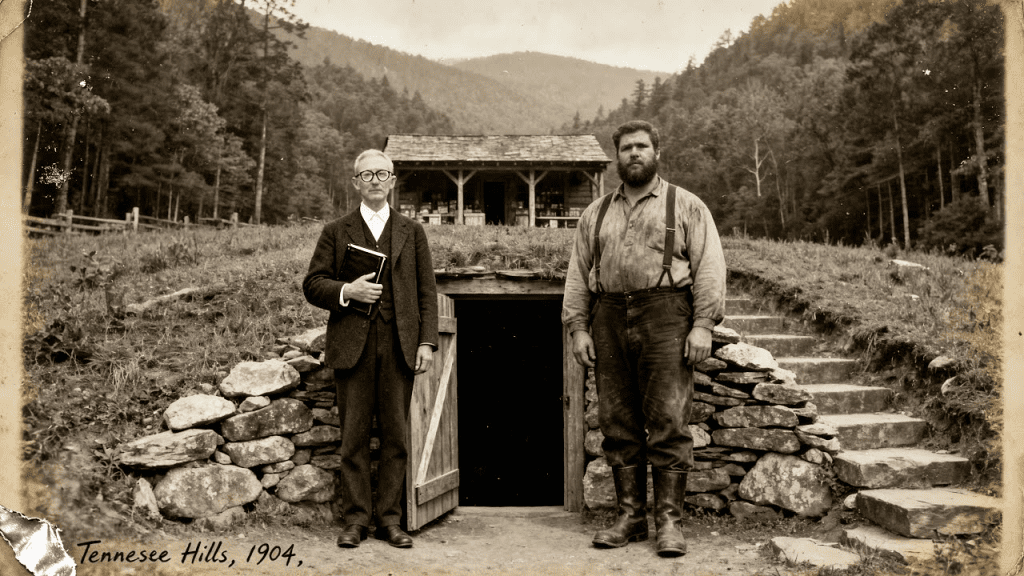The Mountain Brothers’ “Pleasure Cellar”: Unraveling the Dark Fiction of 17 Missing Women in 1904 Tennessee Hills
Imagine stumbling upon a tale so chilling, it blurs the lines between fiction and reality, leaving you haunted by its mystery. The legend of the Mountain Brothers and their “Pleasure Cellar” — set in the rugged hills of Tennessee in 1904 — grips the imagination with whispers of lost women, unspeakable acts, and a tale that has transcended time. This gripping story, although fictional, carries with it a dark allure, one that invites exploration into the depths of human fear, curiosity, and morality. Let’s dive into the fascinating legend of the Mountain Brothers and the chilling “Pleasure Cellar” that holds secrets still whispered about today.

The Fictional Roots of a Haunting Legend
At its core, the story of the Mountain Brothers’ “Pleasure Cellar” is an intricate work of fiction—created to entertain, provoke thought, and challenge the darker corners of our imagination. Popularized by the YouTube channel Tales Beneath the Veil, the narrative weaves together gothic horror, suspense, and folklore, creating a chilling atmosphere that captivates thousands of viewers. Though it draws from themes of real-life human fear, loss, and power, it’s important to remember that this is purely a work of imagination. The creators have been clear that any resemblance to real people or events is purely coincidental.
Despite this, the story still manages to evoke a sense of eerie realism, drawing you into the Appalachian hills of early 20th-century Tennessee. It paints a picture of a time when isolation and darkness could breed terrifying secrets—and when the line between myth and reality was never as clear as it seemed.
The Setting: Tennessee Hills, 1904
The year is 1904, and the setting is the remote hills of Tennessee. The rugged landscape, steeped in mystery, provides the perfect backdrop for the tale of the Mountain Brothers—a group of individuals shrouded in fear and speculation. Their home, nestled deep within the hills, is isolated, cut off from the outside world. The community, isolated and wary, has long whispered about the brothers’ activities, but no one dares to confront them directly. The Mountain Brothers are a source of both fascination and dread.
Video :The Mountain Brothers’ “Pleasure Cellar” & 17 Missing Women Who Served Them (1904)
The brothers’ home, a secluded fortress-like structure, becomes the setting for the darkest part of the story—the infamous “Pleasure Cellar.” This cellar, hidden away from prying eyes, is rumored to have been the site of unimaginable horrors, with 17 missing women said to have been held captive there. Their fates are unknown, and the whispers about their disappearances only fuel the story’s unsettling power.
The Missing Women: Names Lost to Time
Central to the legend is the mystery of the 17 missing women, all of whom vanish without a trace. The story paints a grim picture of young women from surrounding towns and villages, all of whom are believed to have been abducted by the Mountain Brothers. The tale is unclear about how they were taken—some were lured in, others abducted under the cover of night. Whatever the method, the outcome is the same: they disappear, and their fates remain a chilling unknown.
The community, paralyzed by fear and suspicion, dares not confront the brothers directly. Despite numerous disappearances, the local authorities, hampered by the brothers’ influence and the isolation of the area, are powerless to intervene. Their silence speaks volumes, creating an atmosphere of complicity and fear.
In true gothic fashion, the story raises more questions than it answers: Who were these women? What became of them? Why were the Mountain Brothers allowed to continue their reign of terror unchecked?
The “Pleasure Cellar”: A Symbol of Horror and Darkness
At the heart of the tale is the “Pleasure Cellar” itself—a subterranean space that becomes an eerie symbol of evil. The cellar is depicted as a cramped, oppressive environment, dimly lit by flickering lanterns, where the brothers indulged their most depraved appetites. The space is suffused with an overwhelming sense of claustrophobia and suffering, evoking feelings of dread and despair in those who dare to imagine its grim realities.

In many ways, the cellar is a metaphor for the darker side of humanity—a place where morality is suspended, and the most vile acts can take root and fester. The stark contrast between the beauty of the natural world outside and the hellishness of the cellar encapsulates the story’s theme of duality—the light of innocence is constantly overshadowed by the darkness of the brothers’ actions.
The Brothers: Villains or Victims?
While the Mountain Brothers are undeniably cast as villains, the story hints at a more complex portrayal of their character. Some versions of the legend suggest that the brothers themselves were products of violence, shaped by a brutal and unforgiving world. Their actions, though deeply abhorrent, are framed as a twisted response to the pain they endured throughout their lives.
This complexity adds depth to the narrative, asking readers to consider the roots of evil and whether trauma can perpetuate itself across generations. Are the Mountain Brothers simply monsters, or are they a reflection of the world around them—one that was harsh, unforgiving, and often cruel?
The Community’s Silence: Fear and Complicity
One of the most haunting aspects of the legend is the silence of the community. Terrified of retribution, locals choose to turn a blind eye to the brothers’ crimes, opting for self-preservation over justice. The community’s refusal to act is a powerful commentary on the dangers of unchecked power and the corrosive effects of fear.
This theme of complicity is a common one in gothic fiction, where the refusal to confront evil enables it to thrive. The Mountain Brothers’ reign of terror is allowed to continue unchecked because the community is too scared to take a stand. The fear that grips the town is both palpable and relatable—a fear that, in the real world, often leads to inaction in the face of injustice.
Video : The Obese Daughter Who Was Used in His Father’s Bed Experiments—Then The Father Paid Terrible Price…
The Legacy: Why We Tell These Stories
At its core, the story of the Mountain Brothers and their “Pleasure Cellar” is a meditation on the power of storytelling. The creators of Tales Beneath the Veil have woven a tale that evokes the fears of our collective subconscious—the fear of the unknown, the fear of evil, and the fear of being forgotten. These are the fears that bind us together, regardless of time or place.
While the story is fictional, its themes resonate deeply with real-world issues, such as the dangers of unchecked power, the silence of complicity, and the consequences of trauma. These tales endure because they challenge us to confront the darkness and to recognize the importance of vigilance, empathy, and courage in the face of fear.
Conclusion: The Enduring Allure of Dark Fiction
The Mountain Brothers’ “Pleasure Cellar” and the legend of the 17 missing women remain a testament to the allure of dark fiction. By blending elements of gothic horror, suspense, and folklore, the story taps into universal fears while simultaneously providing a chilling narrative that holds our attention.
In the end, the legend serves as a reminder that storytelling has the power to evoke emotions, shape perceptions, and challenge our understanding of right and wrong. It reminds us that, even in the darkest of tales, there is always room for reflection—and that sometimes, facing the shadows can lead to a deeper understanding of ourselves.